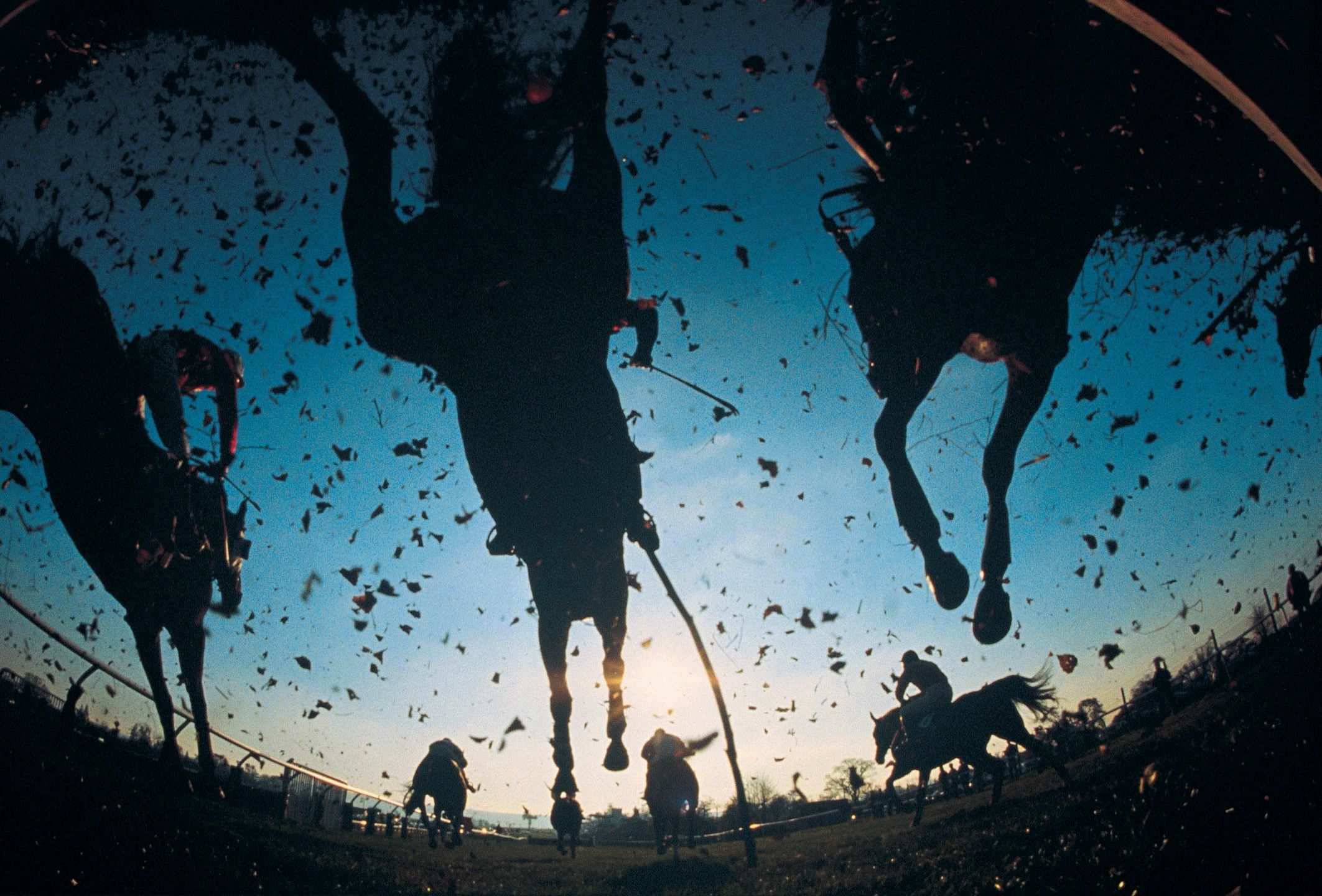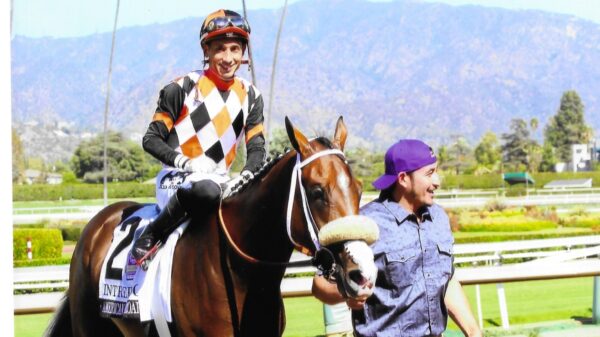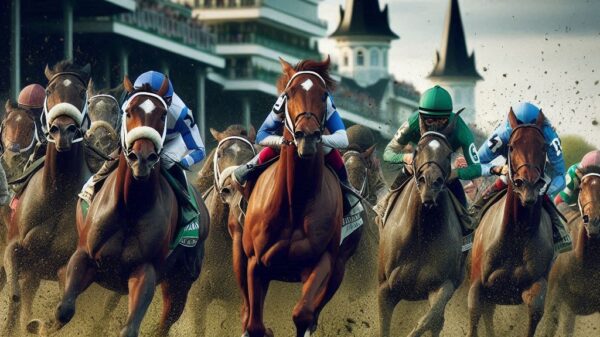THE HISTORICAL PERSPECTIVE FOR GETTING INTO THE RACING HALL OF FAME

Rinaldo Del Gallo, III
By: Rinaldo Del Gallo, III
There are some things that I read that are so poorly thought, I wonder if they are outright mistakes. Take the 1942 American Champion Colt. Consider these two horses, Occupation and Count Fleet. Clearly, from a historic perspective, Count Fleet won the Triple Crown and has had a greater impact on the breed as a sire. So, there is prejudice in his favor. But let us compare the two-year-old seasons in 1942 of both horses. Why in the world would Count Fleet be regarded as the two-year old champion over Occupation?
OCCUPATION: At age 2, Occupation WON the Futurity Stakes (at Belmont, a very big race then), Washington Park Futurity, Washington Park Juvenile Stakes, Arlington Futurity, Breeders’ Futurity Stakes; 2ND Pimlico Futurity, Primer Stakes, Joliet Stakes. (FUN FACT: According to America’s Best Racing do Net, “Occupation’s $2 win payoff [in the Breeder’s Futurity] was a record low $2.20 in 1942.”)
COUNT FLEET: At Age 2, Count Fleet won the Champagne S.(Belmont), Pimlico Futurity, Walden S., Wakefield S.,; 2nd East View S., Washington Park Futurity; 3rd Futurity S.
LET’S LOOK AT THE VARIOUS FACTORS:
STAKES RACE WINS: Occupation won 5 stakes races, Count Fleet 4 stakes.
QUALITY OF STAKES RACES: I suppose there is somewhat subjectivity, but Occupation won more prestigious stakes races, the Belmont Futurity, the Washington Park Futurity at times being the richest races in the world—the Breeder’s Futurity at Keeneland has always been important—I would give the edge to Occupation, although as for Count Fleet the Champagne was and is a big race, and then the Pimlico Futurity was a big race. And while whether one horse race is more prestigious than another horse race is subjective, the purse is an objective number–from that perspective, Occupations accomplishments are objectively more impressive in terms of stakes won measured by their importance by purse size.
HEAD-TO-HEAD COMPETITION: As far as I can tell, Occupation met Count Fleet thrice in 1942, and beat Count Fleet twice with Count Fleet coming in 3rd once. In the Washington Park Futurity, Occupation won, and Count Fleet came in 2nd. (The horse that came in 3rd in the Washington Park Futurity, Blue Swords, was to take many seconds against Count Fleet when they turned three years of age.) In the Belmont Futurity, Occupation won, two-year-old female champion AskMeNow came in 2nd, and Count Fleet came in 3rd. It was only in the Pimlico Futurity that Count Fleet won and Occupation came in second.
As time went on, Blue Swords was to be the sire of NOTHIRDCHANCE (USA) b. M, 1948 {4-n} (dam of Hail to Reason, the sire of Roberto, who is in many pedigrees.). Nothirdchance was the 2nd dam of 3 for 3 MEADOWLAKE (USA) ch. H, 1983 {4-n}. Count Fleet is in the highly influential and nearly ubiquitous Mr. Prospector.
Ironically, with a significantly weaker resume, Occupation’s full brother Occupy took the two-year-old Championship of 1943 with wins in the Belmont Futurity and Washington Park Futurity and no other stakes races. (Both were sired by Bull Dog, and had the dam Miss Bunting, thus providing a link to Planet). Occupy took second in the Arlington Futurity, Prairie State S., Primer S., Breeders’ Futurity–clearly a less impressive run (though impressive enough) as compared to Occupation.
Occupy, as the sire of LITTLE HUT (USA) b. M, 1952 {4-r}, the dam of Northfields and Habitat had a significant mark on the breed.
The racing accomplishments of Count Fleet versus Occupation thus laid out for you the reader, both Wikipedia and TbHeritage list Count Fleet as the champion two-year-old of 1942. According to Wikipedia, this was determined by the “Daily Racing Form and Turf & Sport Digest Awards” at the time. (When there are different declared champions by the publications, it was so stated).
While I don’t have all the records, examining Count Fleet’s record from the Hall of Fame, I can see that Count Fleet raced 15 times at age 2, but many were in maiden or allowance races. His win in the Wakefield at Empire Racetrack was a 6.8-thousand-dollar purse and the East View at the same track had a 7.1-thousand-dollar purse. The Champagne paid 12 thousand. (I don’t have Occupation’s full race record–just his stakes placings from pedigree query dot com and what I can glean from Count Fleets DRF record at the Hall of Fame.)
The ’42 Washington Park Futurity won by Occupation over Count Fleet was a 68-thousand-dollar race at a time when the Kentucky Derby (of 43) had a purse of 72 thousand, the Preakness (of ’43) had a purse of 60 thousand, and the Belmont (of ’43) had a 42 thousand purse.
As for the Belmont Futurity, it rivaled the Washington Park Futurity with a purse of 69 thousand dollars. According to Wikipedia, “[u]ntil 1956, [the Belmont Futurity] had a larger purse than that of the Belmont Stakes.” In 1943, the Belmont Stakes purse was 42 thousand, 7 thousand dollars less than the aforementioned purse of the 1942 Belmont Futurity. (This I gleaned from Count Fleet’s record from the Hall of Fame.) The Belmont Futurity too was an Occupation first, Count Fleet second race. It was only in the Pimlico Futurity-then worth 34 thousand dollars (significantly less than the Belmont Park Futurity and the Washington Park Futurity) that Count Fleet was first and Occupation second. To be fair to Count Fleet, in the Belmont Futurity and the Washington Park Futurity that Occupation won, both races were won by only a neck over Count Fleet. Count Fleet won the Pimlico Futurity by 4 lengths. Still, a win is a win. After Count Fleet’s loss to Occupation in the Belmont Futurity, Count Fleet never lost again, culminating with his sealing the Triple Crown in the Belmont Stakes with a 25-length romp, only to never race again.
Sizing up (1) number of stakes wins, (2) the relative importance of the stakes wins by purse size, and (3) head-to-head competition, I do not believe it was reasonable to regard Count Fleet as the best two-year-old of 1942. In my opinion, Occupation was so much the better two-year-old of 1942, regarding Count Fleet as the better of the two horses is of poor judgment and not a reasonable assessment.








